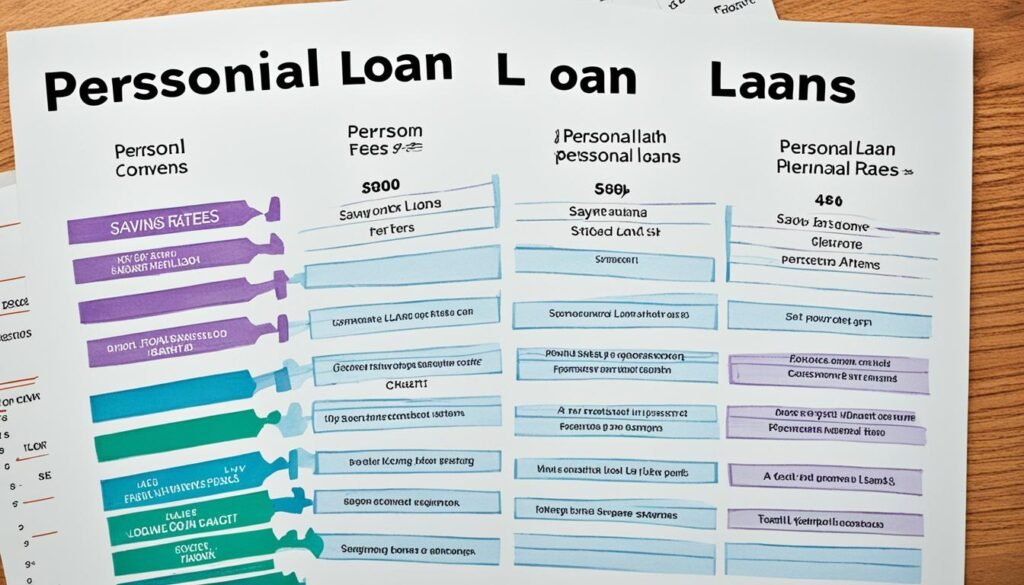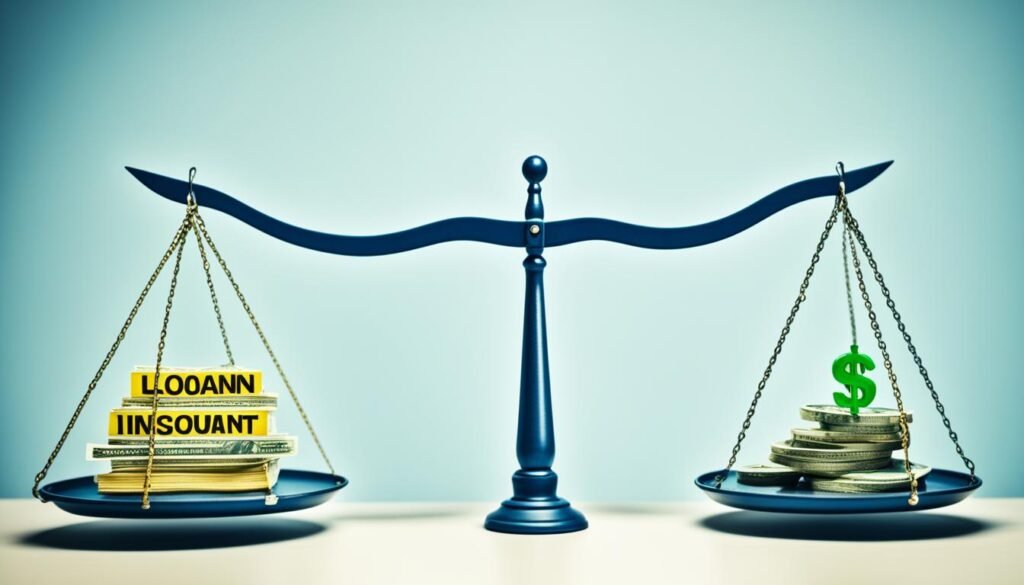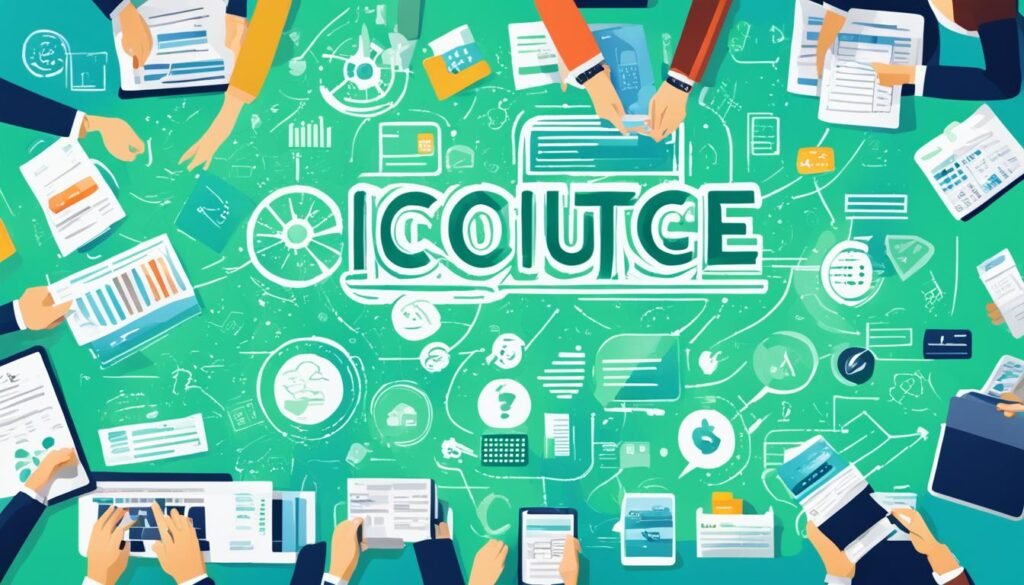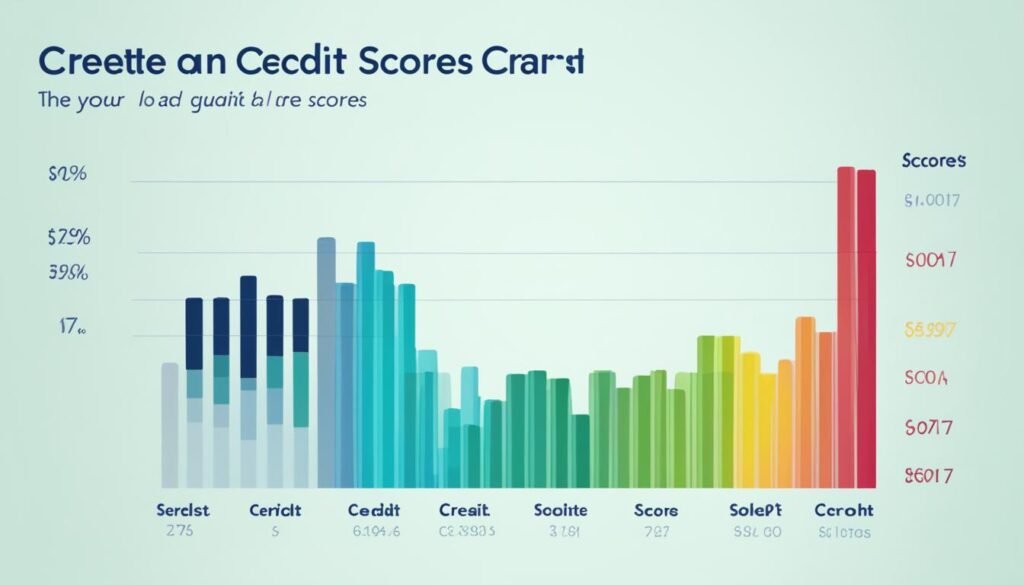Managing your money can be challenging, but there are many ways to get help. Personal loans stand out as a top pick for those needing extra cash. If you think a personal loan might help you, read on. We’ll look at the good and not-so-good sides. This will help you decide if it’s a good choice for you.
A personal loan is a type of loan you can get without putting up any assets. It can be used for lots of things like paying off debt, fixing up your home, or handling a surprise bill. Since you don’t have to offer anything as security, these loans are good for people who don’t want to risk their belongings.
Key Takeaways : Personal Loan The Right Choice
- Personal loans are unsecured loans that can be used for diverse financial needs
- They offer lower interest rates than credit cards and flexible use of funds
- Potential drawbacks include the risk of debt and higher monthly payments
- Consider a personal loan for debt consolidation, home improvements, or unexpected expenses
- Avoid using personal loans for discretionary spending or if you have poor credit
What Is a Personal Loan?
A personal loan is an unsecured loan for many needs like debt consolidation. It’s not like a home loan that needs a house as security. This makes it great for various financial needs.
Personal loans usually come with fixed interest rates and fixed monthly payments. This helps people know how much they’ll pay each month. It’s especially good for those with lots of debt they want to combine into one payment.
When quick funds are needed, personal loans can be a smart choice. Some lenders put the money in your account by the next business day. Plus, average interest rates on personal loans are often lower than credit cards, saving you money.
“Personal loans can be a useful tool to help manage your finances, whether you’re looking to consolidate debt, make home improvements, or cover unexpected expenses.”
Also Read : How Does Insurance Protect Me?
Versatility of Personal Loans
The main plus of personal loans is their flexibility. You can use them for plenty of things, like:
- Debt Consolidation: They can combine your debts into one, usually with a lower interest rate. This can save you money.
- Home Improvements: Need funds for a home project? Personal loans can help.
- Unexpected Expenses: For surprises like a big medical bill or a broken car, personal loans can cover the cost.
This flexibility allows each person to use the loan how they see fit. It’s why personal loans are a top choice for many.
Advantages of Personal Loans

Personal loans stand out when seeking financial options. They often have lower interest rates than credit cards. On average, personal loan rates are 12.35% compared to credit cards’ average of 20.67%.
This type of loan also offers flexibility in fund usage. You can use it for debt consolidation, home improvements, and more. Personal loans allow freedom in choosing how to spend the borrowed money. They serve various financial needs well.
Personal loans bring predictability with fixed monthly payments. You know what to pay each month because the interest rate and payment amount stay constant. This makes budgeting and financial planning simpler compared to credit cards’ changing terms.
“Personal loans often come with lower interest rates than credit cards, making them a more affordable financing option. Additionally, they offer flexibility in how the funds can be used and provide the convenience of fixed monthly payments.”
Exploring the personal loan advantages can help borrowers make better financial choices. They should weigh the lower interest rates, freedom in fund use, and the benefit of fixed payments when considering personal loans.
Also Read : What Are Asthma Symptoms?
Disadvantages of Personal Loans
Although personal loans have their benefits, we must think about things that might not be so great. The biggest downside is that personal loans often have higher interest rates than some other types of loans, like ones from credit cards or mortgages. Especially for those with poor credit, the situation can get worse. This is because lenders might up those rates to cover the extra risk.
In addition to high rates, personal loans ask for a lot. You need a good credit score, a reasonable debt-to-income ratio, and a steady job history. For many people, especially those with checkered credit or less financial history, meeting these requirements can be tough.
| Disadvantage | Description |
|---|---|
| Higher Interest Rates | Personal loans typically have higher interest rates than alternatives like credit cards or home equity loans, particularly for borrowers with poor credit. |
| More Eligibility Requirements | Lenders may have stricter criteria for personal loans, including credit score, debt-to-income ratio, and employment history, making them less accessible for some borrowers. |
| High Fees and Penalties | Some personal loan lenders may charge high fees, such as origination fees or prepayment penalties, which can significantly increase the overall cost of borrowing. |
So, think hard before you get a personal loan. It’s vital to look at both the good and the bad to see if it really fits your needs and financial situation. Knowing the disadvantages helps you make a smart choice and not end up with more financial stress.
Also Read :How Do You Navigate The Loan Application Process Successfully?
When to Consider a Personal Loan
If you need money for something important and don’t want to use money tied to your assets, a personal loan is a good choice. They’re not tied to your car or house. You can use them for many things, like debt consolidation or making your home better. Now, we’ll talk about when a personal loan is a smart move.
Debt Consolidation
Got lots of credit card debts with big interest rates? A personal loan could help. It puts them all together, possibly with a smaller interest rate. This way, you might pay less every month and over time.
Home Improvements
Want to spruce up your place but lack the cash? A personal loan might be the ticket. It works well if you can’t get a home equity loan. This is often the case for new homeowners or if your home’s value hasn’t gone up much.
Unexpected Expenses
Life throws curveballs, like surprise medical bills or broken cars. A personal loan can be a lifesaver in these moments. It lets you pay for these surprises without harming your savings or using high-interest credit cards.
Think hard about your finances before getting a personal loan. Make sure you understand your budget and can pay it back. Comparing different loans and their conditions is a smart move. This makes sure you’re making the best decision for you.
Also Read :What Are The Different Types Of Insurance?
When Not to Consider a Personal Loan

Personal loans can help in some cases, but they’re not always the best option. It’s important to know when to skip them. This way, you can avoid future money problems.
For Discretionary Spending
Personal loans are best for needs like debt or sudden costs. They’re not for fun things like weddings or trips. Paying off these loans long-term for a short fun is tough. It can slow down your saving for bigger dreams.
If You Have Poor Credit
It’s hard to get good terms on a loan with a low credit score. Lenders see you as more of a risk. This leads to high interest rates and tough rules. In this case, maybe hold off on a loan. Work on your credit score first.
Remember, avoid personal loans for things like discretionary spending if your credit is poor. They can cause money issues. Plus, it might be hard to keep up with the payments.
“Personal loans should be used for essential expenses, not for discretionary spending that can wait. It’s important to carefully consider the long-term financial impact before taking out a personal loan.”
Also Read : How To Boost Your Credit Score For Better Loan Options
Personal Loan The Right Choice

When looking at a personal loan, it’s key to think about the good and bad. They might have lower rates than credit cards. You can get flexible cash and pay off with fixed amounts each month. But, there could be high rates and big fees. Misusing them might hurt your credit score.
Denny Ceizyk, a senior writer at Bankrate, says, “Personal loans are a good choice if you have room in your budget for a fixed payment and a steady, reliable income. But they aren’t the best for everyone.” The decision depends on things like your credit score and how much you make versus what you owe.
To see if a personal loan fits, look at these personal loan decision factors:
- Your credit score: You might get better deals if you have good credit.
- Your debt-to-income ratio: It shows how much you owe versus how much you make. This helps lenders see if you can pay back a loan.
- Your monthly budget: Figure out if you can afford to add a fixed payment each month.
Think about the good and bad of getting a personal loan. Look at your own money situation. By taking your time to compare and think things through, you can decide if a personal loan is right for you. Make sure it fits your financial plans and what you need.
“Personal loans are a good choice if you have room in your budget for a fixed payment and a steady, reliable income, but they aren’t the best financial move for everyone.”
– Denny Ceizyk, Bankrate senior loans writer
Also Read : What Is Professional Liability Insurance?
Factors to Consider Before Taking Out a Personal Loan

Before getting a personal loan, carefully think about a few important things. Your credit score, debt-to-income ratio, and monthly budget are key. They will affect how well you can handle the loan.
Your Credit Score
How good your credit score is shows lenders if you’re reliable. A higher score means you might get a lower interest rate and better loan terms. But, if your score is low, you might not get as good options. Trying to boost your score before you apply can help.
Your Debt-to-Income Ratio
Your debt-to-income ratio looks at how much of your income pays off debts. Lenders check this to see if you can take on more debt with a personal loan. It’s best to have a ratio under 43% for easier loan approval and better terms.
Your Monthly Budget
Check your monthly budget to see if you can fit in the loan payments comfortably. Also, consider what you already pay for, like rent and other loans. Adding a new loan should not stretch your budget too thin. This can cause problems with paying on time and harm your credit.
| Factor | Importance | Lender Perspective |
|---|---|---|
| Credit Score | High | Indicates creditworthiness and risk of default |
| Debt-to-Income Ratio | High | Determines your capacity to make loan payments |
| Monthly Budget | High | Ensures you can comfortably afford the loan payments |
Thinking about your credit score, debt-to-income ratio, and budget is key before a personal loan. It helps you make a smart choice. This assessment can get you the best loan terms. It also makes managing your loan easier.
How to Get the Best Personal Loan Rates

To get the best personal loan rates, you should compare offers from different lenders. This way, you can find the best personal loan rates for you. It’s important to look around and find loans that fit your financial needs.
Shop Around and Compare Lenders
Starting with various lenders, both online and traditional, is a good move. This lets you see what rates and terms they might offer. Plus, it won’t hurt your credit score because it’s a soft check. Make sure to compare lenders and their offers to get the best deal.
Improve Your Credit Score
Your credit score is key in getting a good interest rate on a loan. To boost your credit score, check your report for any mistakes. Pay your bills on time, keep credit card use low, and don’t get too many new credits before applying for a loan.
By comparing lenders and raising your credit score, you increase your chances of finding the best personal loan rates. Doing these things can help you save a lot of money over time.
“The key to getting the best personal loan rates is to shop around and compare offers from multiple lenders. By pre-qualifying and improving your credit score, you’ll be in a strong position to find the most competitive terms.”
Alternatives to Personal Loans

Personal loans are not the only choice for financing. Options like credit cards, home equity loans, or borrowing from loved ones are available. Choose based on your needs and financial health.
Credit Cards
Consider a zero-interest credit card if you can pay off within two years. It’s great for reducing high-interest debt or a big purchase.
Home Equity Loans
Homeowners can use a home equity loan for lower interest. It uses your home as security, often meaning a better rate than a personal loan.
Borrowing from Family or Friends
For smaller financial needs, asking family or friends for a loan is another route. It may be flexible and cost less. However, ensure you have a clear payback plan.
Think through your financial status and the loan’s terms carefully. Exploring alternatives can help you pick the best option.
| Personal Loan Alternatives | Pros | Cons |
|---|---|---|
| Credit Cards |
|
|
| Home Equity Loans |
|
|
| Borrowing from Family/Friends |
|
|
Every alternative has its pros and cons. It’s key to consider your financial state to choose wisely. Find what fits your situation best.
Personal Loan Application Process

Getting a personal loan is pretty simple, but you need to get ready. First, make sure you have all the documents and info needed. This will help make your application go smoothly.
The personal loan application has a few basic steps:
- Check your credit score first. This lets you see how lenders might view you. It also helps spot any issues ahead of time.
- Get pre-qualified by talking to different lenders. This involves sharing some financial info with them. It helps you see what each lender can offer in terms of rates and conditions.
- Then, comes the serious application. After picking your preferred lender, you fill out a full application. You’ll also need to submit documents like pay stubs, tax returns, and proof of your income.
- The lender will then do a hard credit check. This could briefly lower your credit score a bit.
- Now, you wait for their decision. It usually takes a few days for the lender to review your application and credit.
- If they say yes, you sign the loan agreement. The money is only given to you after you sign.
People with good credit, a steady income, and low debt usually get the best loan offers.
| Lender | Interest Rate | Loan Amount | Loan Term |
|---|---|---|---|
| Lender A | 8.99% | $10,000 – $50,000 | 12 – 60 months |
| Lender B | 10.25% | $5,000 – $35,000 | 24 – 48 months |
| Lender C | 7.99% | $15,000 – $75,000 | 36 – 84 months |
Keep in mind, the personal loan application process can be a bit different with each lender. So, always look over the requirements and terms closely before you apply.
“The key to a successful personal loan application is being prepared and shopping around for the best rates and terms.”
Managing Your Personal Loan Responsibly

Taking out a personal loan can greatly help you, but it’s important to handle it right. Making payments on time and keeping an eye on your credit score are crucial.
Make Payments on Time
It’s vital to pay your personal loan each month without delay. Doing so not just avoids extra charges but shows lenders you’re trustworthy. This boosts your credit score and makes getting other loans, like for a house or car, easier.
Monitor Your Credit Score
Watching your credit score is a key part of being a responsible loan holder. When you first apply for the loan, your score might briefly drop. This happens because the lender checks your credit report.
But, as you pay off the loan and lower your debt, your score should get better. However, if you start missing payments or your debts get too high, your score may drop a lot. This can then make getting a loan in the future harder. So, always keep an eye on your credit score. This way, you can fix problems quickly and keep your credit in good shape.
| Responsible Personal Loan Management | Benefits |
|---|---|
| Make Payments on Time | Avoid late fees, show lenders you’re reliable, boost your credit score |
| Monitor Credit Score | Spot and fix issues early, keep a good credit history |
If you manage your loan well, you’ll not only reach your financial goals, but you’ll also build a stronger credit. Stick to the tips here, and handling your personal loan will be smooth sailing.
Also Read : How Long Does It Take To Get Home Equity Loan?
Conclusion
Personal loans can come in handy for things like merging debts or sudden bills. Yet, they might not be your go-to for shopping sprees or if your credit’s not great. It’s wise to think about what’s good and bad, plus your money situation, before choosing.
They can offer lower rates than credit cards and fixed payments each month. But, remember, your credit score could be affected, and taking on more debt is risky. Be sure a personal loan fits your financial plan and aims.
Think about what you need and where you stand financially before picking a personal loan. With good study, picking the right lender, and being careful with your loan, you could better your financial future. Make sure to look at all your choices and pick what’s best for your money and plans.
FAQs
What is a personal loan?
A personal loan helps cover many costs. These include fixing up your home or handling debts. It’s not tied to any asset you own.
What are the advantages of personal loans?
Personal loans usually have lower rates than credit cards. You can use them for various needs. Plus, you pay a set amount each month.
What are the disadvantages of personal loans?
But, personal loans may come with higher rates than other loans. You have to meet some rules to get one. Also, there might be extra fees.
When is a personal loan a good choice?
Consider a personal loan for grouping debts or improving your house. They’re also good for sudden costs.
When is a personal loan not a good choice?
They are not good if you earn irregularly or need to change payments. Having a bad credit score could make it hard to get one.
What factors should I consider before taking out a personal loan?
Check your credit score and how much debt you have. Also, see if you have enough to make the payments comfortably.
How can I get the best personal loan rates?
For the best rates, look at offers from many lenders. Make sure your credit is good. A strong credit score means lower rates.
What are some alternatives to personal loans?
You could turn to credit cards, your home’s equity, or ask family or friends for help.
What is the personal loan application process?
First, know your credit score. Then, see what rates lenders offer. When you pick, you’ll fill out a full application with a credit check.
How can I manage my personal loan responsibly?
Always pay on time. Watch your credit score too. Sticking to the loan’s terms will boost your credit rating.
Source Links
- https://www.bankrate.com/loans/personal-loans/pros-cons-of-personal-loans/
- https://www.bankrate.com/loans/personal-loans/reasons-to-get-a-personal-loan/
- https://www.nerdwallet.com/article/loans/personal-loans/personal-loan-why-should-i-get




